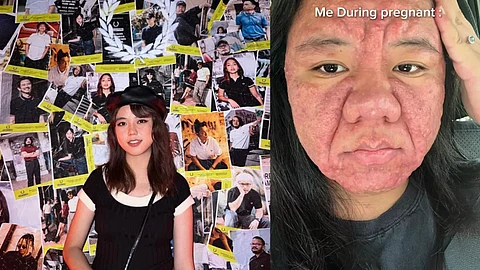A TikTok video by Malaysian creator Farah Faizal (@ayyitslala) has gone viral, gaining over 100 million views. In the clip, the 28-year-old mother reveals sudden pregnancy-related skin changes — painful, inflamed rashes, cystic acne-like bumps, and bumpy textured skin across her face that persisted even after childbirth.
While her honesty sparked empathy, some insensitive comments called it a “natural birth control ad” and claimed she looked “unrecognizable.” Others took the mockery further, joking that she should sue her husband — and even the baby — for her condition. One user quipped, “If he ever asks for another child, she’s entitled to say no in the harshest way possible.” Another sarcastically added, “Today’s episode of ‘Reasons not to get pregnant’ is brought to you by THIS — hard pass.”
Experts, however, emphasize that skin changes during pregnancy are common and usually temporary for most women.


